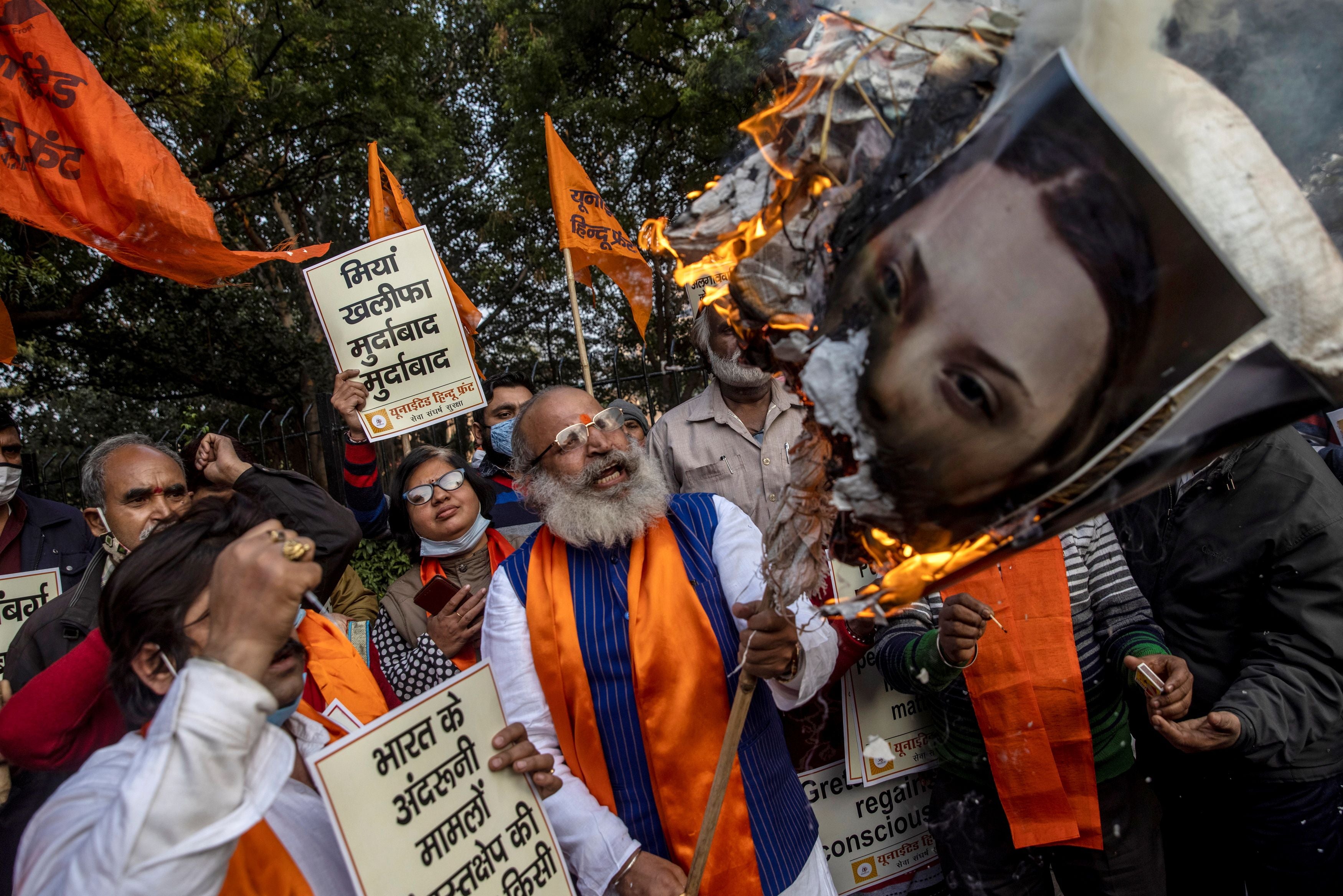Has Delhi Police opened a criminal case against Greta Thunberg for her farmer protest tweets?
Posters of Greta Thunberg were burnt in protest by Modi government supporters as police open probe into content of tweets shared by activist

India's long-rumbling farmer protests took an unexpected turn this week after the teenage climate activist Greta Thunberg tweeted her support for the demonstrators – and found herself at the centre of a Delhi Police investigation as a result.
The Swedish activist's social media posts offering "solidarity" with Indian farmers followed a similar tweet by the singer Rihanna, sharing a CNN article about the authorities' handling of the protests and asking "why are we not talking about this?"
They and other international celebrities sparked a backlash from supporters of the Modi administration, including swathes of Bollywood and Indian cricket stardom, accusing them of interfering in the country's internal affairs and vowing "unity" in India itself.
But a particular post by Ms Thunberg also caught the attention of the police, after she shared a so-called online "toolkit" – a guide for the protesting farmers – which they authorities claims has origins tied to a Sikh separatist movement for an independent "Khalistan".
It was widely reported in the Indian media that Delhi Police had opened a case and filed an initial complaint form – known in India as an FIR or First Information Report – against the 18-year-old environmentalist.
At a dramatic late news conference on Thursday, the police confirmed a case had been opened but said it targeted the "toolkit" itself, not Ms Thunberg. "We have not named anybody in the FIR. It is only against the creators of the toolkit," a police spokesperson said.
The cyber-crime unit of the Delhi Police registered the case on charges including “sedition”, “criminal conspiracy” and “promoting hatred” against the unnamed creators of the toolkit in question, which was shared by Ms Thunberg in a post that has now been deleted.
“Preliminary enquiry has revealed that the toolkit in question appears to have been created by a pro-Khalistani organisation, 'Poetic Justice Foundation',” police commissioner Praveer Ranjan said.
The toolkit in question was titled “Global Farmers' Strike - First Wave’”, a document calling itself a plan of action on how to campaign in the farmers' protest, listing hashtags to be run at particular dates and times and calling for a digital strike.
It urged people to stand up against "failing democracy" and stand up against the "unregulated corporatisation" of the farming sector. It also listed the names of UK members of parliament who could be petitioned to try and gain their support for the protests, with a view to revising the UK's stance on the issue.
Delhi Police said the toolkit appeared to correspond with the violence that spilled over from a peaceful farmers' march marking the nation's Republic Day, when it celebrates its independent constitution. One protesters was killed during the clashes and hundreds of police and protesters were injured.
“If you go by the unfolding of events of 26 January, it reveals a copycat execution of the action plan. It is a matter of concern for Delhi Police,” Mr Ranjan said.
If the police decides that the toolkit amounts to a threat to India's national security, then it is possible that those who shared it online could face sedition charges.
Speaking to The Independent, Delhi Police spokesperson Chinmoy Biswal said a full investigation would be carried out into the toolkit, refraining from mentioning Ms Thunberg.
“We would investigate everything that the toolkit in question would link to and lead to. When investigations are done all the aspects [will be] covered,” said Mr Biswal.
The protesting farmers are calling for the repeal of three laws which, combined, will reform the agricultural sector in India and open it up to greater privatisation.
The government says the reforms are long overdue and will benefit farmers in the long run, allowing them to sell their produce to customers anywhere in India. But farmer unions fear the move will open up producers to be exploited by big corporations, and threaten the state-guaranteed minimum price that they currently receive for their goods.
To complicate matters further, supporters of the government have claimed the farmer movement has been infiltrated by those who want to attack the Modi administration for other motives, including sympathisers of the separatist Khalistani cause. Groups advocating for an independent Khalistan are largely banned in India.
After she deleted her first post with the toolkit, Ms Thunberg shared an updated link which included a document with the same hashtags as the previous one, including “FarmersProtest” “StandWithFarmers” and calling for a “digital strike” with the hashtag “AskIndiaWhy”. Gone were recommendations to protest at embassies, however, and to call out prominent businessmen including Mukesh Ambani and Gautam Adani.
Aside from the police investigation, India has witnessed counter-protests in the last couple of days in which supporters of the government burned effigies and photographs of Ms Thunberg, Rihanna and Meena Harris, the lawyer and niece of US vice president Kamala Harris, who also tweeted her support for the farmers.
On Friday, Twitter CEO Jack Dorsey liked several tweets praising Rihanna's stand on the farmers' protest. His company has itself clashed with the Indian government for refusing to ban accounts sharing a hashtag accusing Narendra Modi of "farmer genocide".
Talks between farmers and the Modi administration to bring an end to the protests have stalled. The government has repeatedly attempted to explain away their concerns, as well as offering to suspend the reforms for 18 months for consultations, but this was rejected by protest leaders.
Join our commenting forum
Join thought-provoking conversations, follow other Independent readers and see their replies
Comments



Bookmark popover
Removed from bookmarks